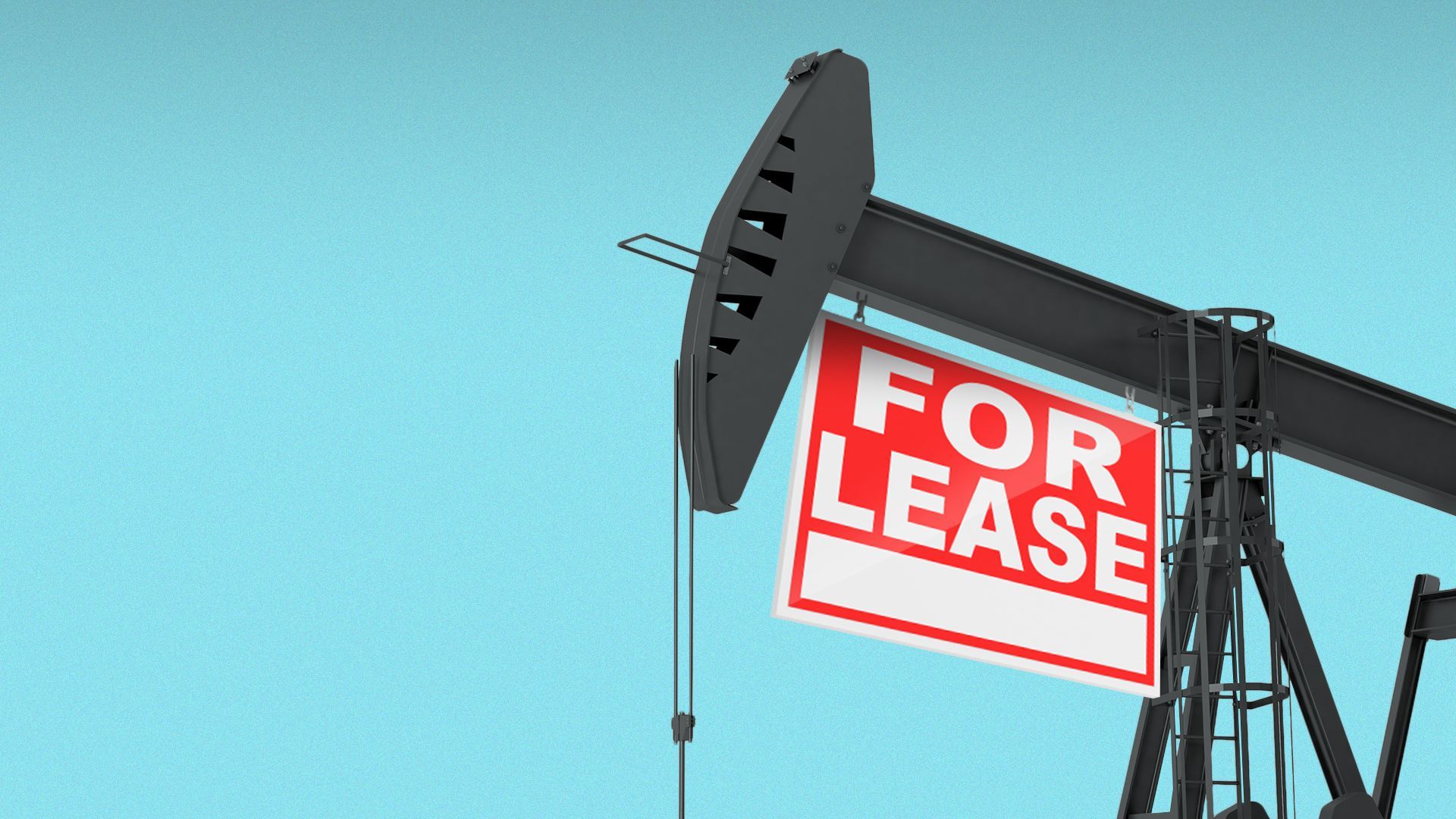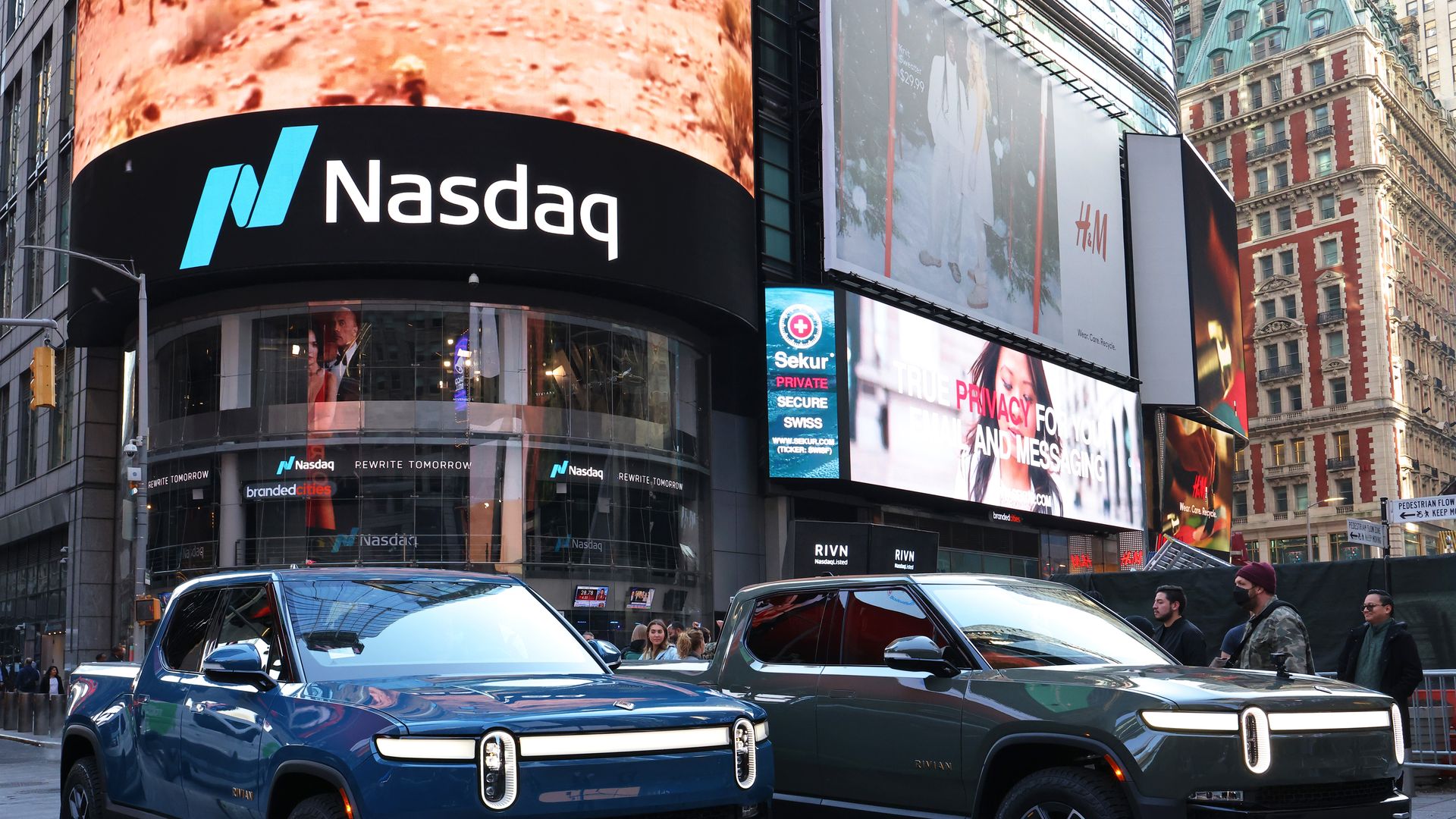| |
| |
| |
| Presented By National Rural Electric Cooperative Association |
| |
| Axios Generate |
| By Ben Geman and Andrew Freedman · Apr 18, 2022 |
| 🍩 Welcome back, readers! Today's Smart Brevity count is 1,093 words, 4.5 minutes. 🎸 This week in 1981 Tom Petty & The Heartbreakers released a flawless single that's today's intro tune... |
| |
| |
| 1 big thing: Biden's oily Rorschach test |
 |
|
| Illustration: Annelise Capossela/Axios |
| |
| The Biden administration's leasing policy finds a White House grappling with the dueling pressures of tight energy markets and a fast-warming planet, Ben writes. Catch up fast: The Interior Department will resume selling oil-and-gas leases on federal lands but raise the fees companies must pay on what they produce, the agency said Friday afternoon. Interior said it will publish notices this week for the first onshore lease sales since President Biden froze the program soon after taking office, offering 144,000 acres. Zoom in: Interior vowed the policy, which follows a long review of the climate and financial effects of leasing, is not business as usual. - Interior said the acreage offered is only one-fifth the amount companies had called for auctioning.
- This "pragmatic approach focuses leasing on parcels near existing development and infrastructure," Interior said, vowing it will "help conserve the resilience of intact public lands and functioning ecosystems."
- Royalties rise from 12.5% to 18.75% to "ensure fair return for the American taxpayer."
What they're saying: Friday's announcement on the eve of a holiday weekend pleased almost nobody. - Several environmental groups blasted the decision, though some of the large, Democratically-aligned groups held their fire.
- "Candidate Biden promised to end new oil and gas leasing on public lands, but President Biden is prioritizing oil executive profits over future generations," Friends of the Earth's Nicole Ghio said in a statement.
- Evergreen Action called the acreage reduction "encouraging" but nonetheless said leasing "conflicts" with administration climate goals.
The other side: Multiple industry groups offered qualified praise mixed with criticism. - The American Petroleum Institute said it was pleased to see the leasing resumption, but "we are concerned that this action adds new barriers to increasing energy production, including removing some of the most significant parcels."
- "At a time of high energy costs, these changes to long-standing fair and reasonable lease terms may further discourage oil and natural gas investment on federal lands."
Flashback: Biden paused new leasing soon after taking office to enable a federal review. But AP notes "A federal judge in Louisiana ordered the sales to resume, saying Interior officials had offered no 'rational explanation' for canceling them." The big picture: Biden vowed to thwart new oil-and-gas development on federal lands during the campaign as part of a wider push on climate change. - But the White House has moderated its posture amid the gasoline price surge and the political jeopardy it brings; recently it called for faster domestic output increases.
- Russia's war on Ukraine has caused a commodity shock, and also prompted new White House support for boosting LNG exports to Europe.
|
    |
| |
| |
| Bonus: Charting federal lands oil production |
 Data: BLM, DOI, EIA, Barclays Research; Chart: Thomas Oide/Axios Large volumes oil are produced on federal lands and waters, but their share of total U.S. output has shrunk thanks to the shale boom that unfolded largely on private acreage. |
    |
| |
| |
| 2. Climate's role in France's high-stakes election |
 |
|
| Photo Illustration: Eniola Odetunde/Axios. Getty Images photos: Thierry Monasse |
| |
| The climate and energy future of one of the world's largest economies is at stake, French President Emmanuel Macron said a week before his contest against far-right Marine Le Pen, Ben writes. Driving the news: Macron called Le Pen a "climate skeptic" and called the election a "civilizational choice" at a Saturday rally in Marseille, Politico reports. "The choice today is clear. The far-right is a climate-skeptic project, a project that wants to leave Europe's climate ambitions, that wants to destroy windmills," he said, per Politico. The big picture: Via Bloomberg, Macron vowed to appoint a minister of energy planning tasked with making France "the first great nation to exit oil, gas and coal." - Several reports called the speech by Macron — whose commitment to climate has come under fire from some environmental groups — a bid for voters who supported far-left candidate Jean-Luc Mélenchon.
- Mélenchon finished third in the first round of voting.
|
    |
| |
| |
| A message from National Rural Electric Cooperative Association |
| Electric co-ops keep the lights on in rural America |
| |
 |
| |
| Electricity powers the economy and American families and businesses expect the lights to stay on at a cost they can afford. That's why electric co-ops have invested more than $50 billion over the last five years to modernize their systems and create a more resilient grid. Learn more. |
| |
| |
| 3. Rivian's risks and opportunities |
 |
|
| Rivian electric trucks in New York City. Photo: Michael M. Santiago via Getty Images |
| |
| Rivian, the most promising automotive startup since Tesla, has exquisite timing: It's ramping up production of game-changing electric pickup trucks and delivery vans just as gas prices are soaring and people are looking for alternatives to fossil fuels, Joann Muller reports. Yes, but: Rivian's vehicles are also launching into the teeth of unprecedented, industry-wide supply chain disruptions that could delay or derail the company's ambitious growth plans. Why it matters: Whether his timing is perfect, or terrible, Rivian CEO R.J. Scaringe's challenge is getting an EV brand off the ground while supplying 100,000 promised delivery vans to his company's largest customer and one of its biggest shareholders — Amazon. - Already, Rivian has conceded that its inexperience is hurting efforts to secure precious semiconductors.
- The microchip shortage and other supply-chain constraints prompted Rivian to cut its 2022 production targets in half, to just 25,000 vehicles.
- The 39-year-old Scaringe, heralded in a 2020 Forbes cover story as Elon Musk's new nemesis, is getting a taste of the growing pains that the Tesla CEO famously lamented as "production hell."
Read the whole story. |
    |
| |
| |
| 4. How to electrify the federal fleet |
 Adapted from a McKinsey & Company report; Chart: Axios Visuals McKinsey just published advice for the White House as officials seek to make good on plans to electrify the massive federal vehicle fleet, Ben writes. State of play: Right now only around 3,200 vehicles, or less than 1% of the federal fleet, are electric, McKinsey notes. - President Biden last year set a target of 100% zero-emissions vehicle acquisitions by 2035, with a 2027 target for light-duty models.
- But it faces big challenges, including transition of the huge postal fleet.
Driving the news: The analysis lays out the challenges of transforming such a large fleet — and they go beyond just money. - For instance, good communication with employees is needed on charging practices and more.
- It also suggests a "segmentation" approach that begins quickly with regular civilian vehicles and proceeds more slowly with "mission-critical" models.
Why it matters: Electric cars and trucks can help cut the federal government's big carbon footprint. More broadly, corporate and government procurement can be a key market driver. Read the report. |
    |
| |
| |
| 5. Stripe bolsters carbon removal lobbying |
 |
|
| Illustration: Aïda Amer/Axios |
| |
| Stripe is adding D.C. lobbying muscle alongside the payment tech company's expanding work with corporate partners on carbon removal deals, Ben writes. Driving the news: Stripe retained the clean energy and climate-focused lobbying firm Boundary Stone Partners, a newly public filing shows. What they're saying: "We look forward to listening and engaging with policymakers across the political spectrum to explore ways to build on the private sector's efforts to deliver permanent carbon removal at scale as quickly as possible," Stripe told Axios. Catch up fast: Stripe in recent years began making carbon removal purchases and connecting other corporate buyers with removal startups too. Last week brought news that Stripe is teaming with Meta, Alphabet and others on a nearly $1 billion, nine-year removal purchase fund. It's designed to help create market demand for nascent technologies. |
    |
| |
| |
| A message from National Rural Electric Cooperative Association |
| Electric co-ops keep the lights on in rural America |
| |
 |
| |
| Electricity powers the economy and American families and businesses expect the lights to stay on at a cost they can afford. That's why electric co-ops have invested more than $50 billion over the last five years to modernize their systems and create a more resilient grid. Learn more. |
| |
| Thanks for reading and see you back here tomorrow! |
 | It's called Smart Brevity®. Over 200 orgs use it — in a tool called Axios HQ — to drive productivity with clearer workplace communications. | | |










No comments:
Post a Comment